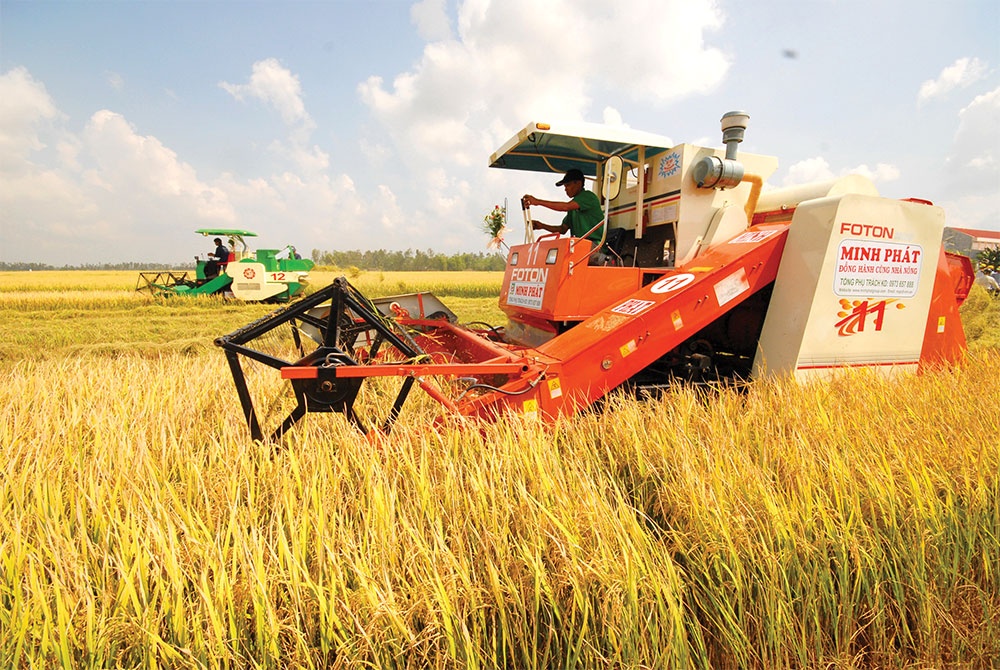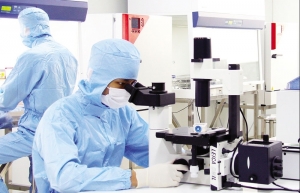Israel and Vietnam heading to deal
 |
| Vietnam and Israel are boosting high-tech agricultural development cooperation, photo: Le Toan |
According to the Vietnamese Ministry of Industry and Trade (MoIT), Vietnam and Israel have concluded final negotiations of the Vietnam-Israel Free Trade Agreement (VIFTA), and both want to sign the deal as soon as possible – with both nations celebrating 30 years of diplomatic relations this year.
Negotiations began at the end of 2015 and preparations for the signing are now being made. Currently, both countries have already exchanged their requirements on opening doors to their respective goods markets. Both sides have also determined their expectations on the levels and roadmaps of tariff reductions, especially for the groups of goods that can bring about big benefits and are their own competitive advantages.
For Vietnam, the key exports include electronics, agro-forestry-fishery products, garments and textiles, footwear, machinery, and wooden products. Meanwhile, for Israel, they are refined oil and petrol, pharmaceuticals and medical equipment, computer software and hardware, farm produce, chemicals, and more.
According to the Vietnam Trade Office in Israel, Israel is Vietnam’s third-largest export market and fifth-largest trade partner in the Middle East region. Vietnam, meanwhile, is Israel’s biggest trade partner in Southeast Asia. The two countries held the latest negotiation round for the VIFTA in August 2022 in Jerusalem.
“Once signed and entering into force, the VIFTA will help both nations to open their doors wider to their respective markets in goods exchanges,” said Le Thai Hoa, trade counsellor at the office. “The Israeli market is very potential for Vietnamese exports because it boasts great demands for imports that can be produced into finished products with high added value, especially for Vietnam’s group of processed food and foodstuffs and assorted consumer products. Israeli companies are serious in doing business, with swift transactions and high solvency.”
Figures from the MoIT indicated that 2-way trade turnover increased from $1.2 billion in 2019 to $1.6 billion in 2020, $1.88 billion in 2021, and about $2.2 billion last year. The figure is expected to soar to about $3 billion next year or in 2025.
Vietnam’s key exports to Israel included mobile phones and spare parts, aquatic products, cashews, coffee, pepper, footwear, and garments and textiles. The country imports from Israel, which has a population of just over 9 million people, products such as computers, electronics spare parts, machinery, and fertilisers.
Over past years, the MoIT said, Vietnam has seen a trade deficit from Israel largely because companies in Vietnam have imported a large volume of computers and electronics spare parts for their production here. The finished products are then exported overseas and domestically consumed. It is estimated that the deficit was about $280 million in 2020, $320 million in 2021, and about $350 million last year.
In its global trade structure, Israel largely exports processed industrial items valued at more than $40 billion a year, and mainly imports materials for its domestic production (about $30 billion a year) and consumer goods such as home appliances, and food and foodstuffs ($15-16 billion annually).
However, according to the MoIT, recently Israel has tightened food safety standards. Despite strong integration, this country protects the market very closely, especially in the agricultural sector. The current average import tax rate for food and foodstuff products stands at 19.1 per cent, much higher than the 3 per cent rate of non-agricultural products.
Vietnam and Israel are now laying one of the focuses in their bilateral cooperation into the agricultural sector, for which Israel is renowned. The Vietnamese agricultural sector, with its high growth opportunities and growing need to better cater to the demands of firms and farmers, has been on the radar of Israeli high-tech businesses.
For example, currently, Vietnam’s TH Group is boosting its cooperation with Israeli firms in its projects worth billions of US dollars to produce fresh milk and agricultural products in Vietnam.
Specifically, Israel’s Afimilk is providing consultancy, an automatic milking system, and cow management software for the group’s $1.2-billion high-tech concentrated dairy and fresh milk production project in the central province of Nghe An.
In another case, with over 40 years of providing agricultural smart solutions in various nations, Israel’s Aquaculture Productions Technologies (APT) is planning to begin its presence in Vietnam.
“We provide solutions and services on consultancy and construction for fish farms both inland and offshore,” said APT’s CEO Michael Pascal.
Vietnam currently has nearly 4,000 hectares of tra fish, and the country is now one of the biggest exporters of this type of fish in the world. “This will give us an opportunity to bring our high technologies to Vietnam,” Pascal said.
APT is among many Israeli firms wishing to boost their investment and business in Vietnam, especially in the agricultural sector.
Three months ago, more than 50 Israeli firms joined a business-to-business matching event with Vietnamese partners in Tel Aviv, and wanted to cooperate with Vietnamese companies in developing projects on investment in and exportation of aquatic products, cashew nuts, coffee, and pepper. Cooperation in other sectors was also discussed, including mobile phones and spare parts, footwear, and garments and textiles.
Vietnam’s agricultural sector has great potential for further development, with high technologies to be applied. For example, Israel’s Agriancer is eager to introduce its high-quality plant varieties in the domestic market.
“Vietnam is focusing on controlling food safety and hygiene, so we want to market here varieties with high capacity in disease resistance. We want to boost cooperation with local partners,” said Trinh Phuong, country manager of Agriancer.
Likewise, Israel’s Galcon is also seeking to sign more contracts with partners in Vietnam. Currently, it is providing automatically controlled irrigation-related products in Vietnam with technology based on cloud and internet platforms.
“We are implementing a number of projects in Vietnam. One of the most typical projects is a 25-hectare project in cooperation with Vietnam’s Vineco. In this project, all processes from irrigation and temperature controlling to harvesting are conducted automatically,” said a representative of Galcon. “This project is currently in the second stage. We also want to deploy other similar projects in Vietnam.”
Accumulatively as of February 20, Israel had 40 valid projects in Vietnam registered at $145.5 million, according to the Ministry of Planning and Investment.
 | Integration at the heart of economic wins Since independence was proclaimed in 1945, Vietnam has harvested major economic perks from its participation in regional and global economic agreements. |
What the stars mean:
★ Poor ★ ★ Promising ★★★ Good ★★★★ Very good ★★★★★ Exceptional
Related Contents
Latest News
More News
- Hermes joins Long Thanh cargo terminal development (February 04, 2026 | 15:59)
- SCG enhances production and distribution in Vietnam (February 04, 2026 | 08:00)
- UNIVACCO strengthens Asia expansion with Vietnam facility (February 03, 2026 | 08:00)
- Cai Mep Ha Port project wins approval with $1.95bn investment (February 02, 2026 | 16:17)
- Repositioning Vietnam in Asia’s manufacturing race (February 02, 2026 | 16:00)
- Manufacturing growth remains solid in early 2026 (February 02, 2026 | 15:28)
- Navigating venture capital trends across the continent (February 02, 2026 | 14:00)
- Motivations to achieve high growth (February 02, 2026 | 11:00)
- Capacity and regulations among British areas of expertise in IFCs (February 02, 2026 | 09:09)
- Transition underway in German investment across Vietnam (February 02, 2026 | 08:00)

 Tag:
Tag:


















 Mobile Version
Mobile Version